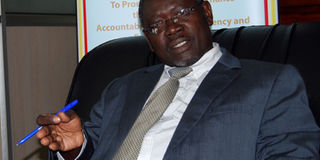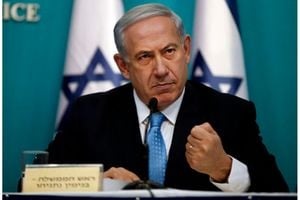Bukenya case may resume, Baku says

Mr Baku during his interview with Daily Monitor last week. PHOTO BY RICHARD WANAMBWA
What you need to know:
In the wake of heavy criticism that IGG Raphael Baku has failed to exhibit independence and is working on the whims of the Executive to fix political opponents, Richard Wanambwa spoke to him about his mandate.
How far have you gone with the Chogm probe? Can we say it’s over now?
I have already publically announced that for intentions and purposes we have concluded Chogm investigations but what is left is doing the final details in the cases which are already in court. When a case is taken to court, the investigations don’t end until the prosecution file is closed. So as we prosecute, we might find new things that may arise.
What were your findings and did the probe by Parliament’s Public Accounts Committee help you in any way?
We looked at all the available information; we looked at the Auditor General’s report, we looked at the Public Accounts Committee report and we interviewed witnesses. We got extra documents from various government departments involved in the execution of Chogm projects.
But you are on record as having dismissed the PAC report on grounds that Parliament lacks the professional mandate to recommend prosecution.
What I said is that when you are investigating for purposes of prosecution, you collect certain evidence and for example the original documents related to the transaction which took place or certified copies. But all those activities may not have been done by the AG or PAC because the AG’s focus is not to take the matter to court for prosecution. When PAC is investigating, they don’t address the component of whether a piece of evidence would be admissible in court or not; they just do their job.
But when we are investigating for purposes of prosecution we have to address the relevance of the document vis-à-vis admissibility in court.
Why did you drop the case against Bukenya?
The case was not dropped but the language we used, which is the official language, is “discontinued”. When a case is taken to court for prosecution, that case is not determined until the court tries the case and makes findings whether the person is guilty or not.
However, between the period of taking a person to court and having the matter ruled upon by court, other things can happen and prosecution can come across new facts which can lead the prosecution to discontinue the proceedings. Anytime where a case has been discontinued, it can be resumed.
So in this particular case, we came across new facts that Spear Motors had taken government to court and the AG has made some pleadings in court, which has a bearing on our own prosecution of Prof. Bukenya because the pleadings are related to the transaction of which he is being prosecuted and so we think the result of the civil case will have a major bearing on the prosecution case.
People say you were forced to drop the charges because of pressure from President Museveni
You see, I am the one who took the matter to court and I did not work under the direction of any person whether from the public or the Executive. I used my judgement and now in the process of conducting the prosecution, I came across new facts which I think are relevant to my case. Therefore, I decided that I should halt the prosecution until the matters I have come across are addressed in the context in which they are raised.
Was it PM Amama Mbabazi who recommended you for this job as some people allege?
I don’t know and I am not aware who recommended me. Maybe the President can tell you. What I know is that I was appointed by the President and I am doing my job basing on the terms of my appointment.
Is Mbabazi using you to fight his political foes in the guise of fighting corruption?
Who are his political foes? I don’t know his political foes. The IGG acts independent of any other influence. I take strong responsibility for all my actions and they can’t be attributed to any other person.
Former Anti-graft Court judge John Bosco Katutsi believes the corrupt should face the death penalty…
Well, I am not sure about that but I know corruption is a serious offence and in many cases, it can lead to people dying. For example, if drugs meant for the very poor patients are stolen and sold in the open market and then you find mothers taking children to hospital and they fail to get treatment and children die. Death of these children can be attributed to the criminals who stole drugs. This gives a justification that corruption should be a capital offence.
However, we also know that internationally, there is a crusade against capital punishment and so we weigh the problems of capital punishment against those of corruption. But so far, the punishment which is available under the Anti-Corruption Act are fairly severe and so my appeal is for the judges to expedite corruption trials, implement maximum penalties provided for in the law before we think of a change to capital offence.
What is lacking in fighting corruption?
Resources committed to fighting corruption are not equivalent to the challenges. Corruption must be dealt with firmly by equipping the responsible institutions through adequate funding and by increasing personnel.
Ugandans are asking you to resign, arguing that you are compromised
Resignation is a matter of conscience and if at any time my conscience tells me to resign, I will resign. If few people just make calls to anybody to resign and then a person resigns then who will remain to run public offices? There are no saints but even people complain about saints. For us we are firm in implementing our mandate.




